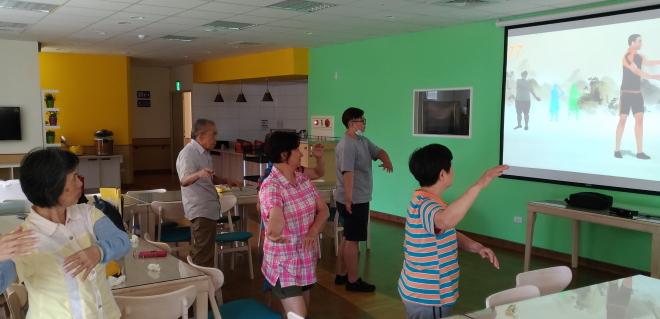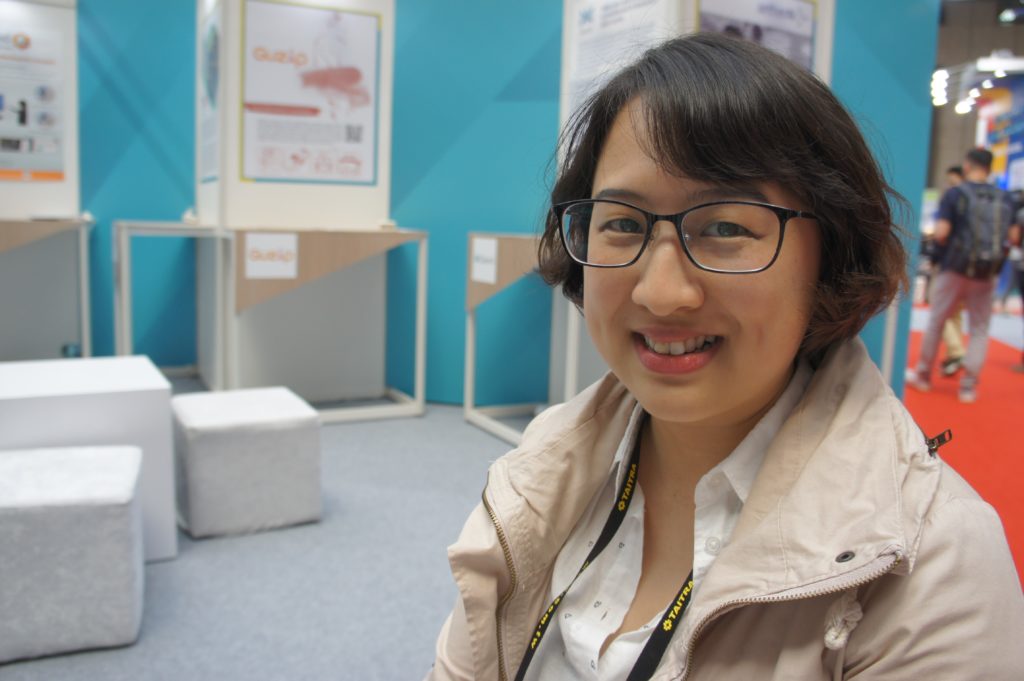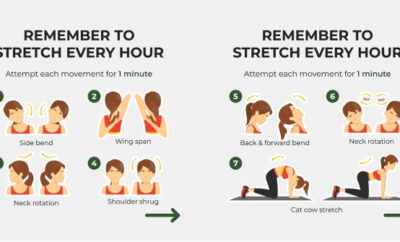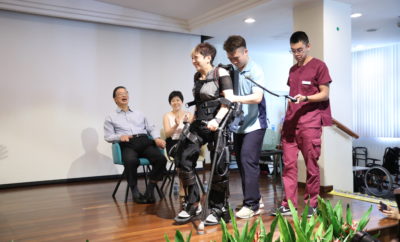
Health x Wellness
LongGood gamifies programmes to help patients regain mobility
LongGood is a Taiwanese health tech start-up supported by the DBS Social Enterprise Support Programme. Since entering Singapore in 2016, their PAPAMAMA system has been adopted by 37 healthcare and medical facilities in Singapore and Taiwan, and has benefited over 1,500 patients from its innovative approach to rehabilitation.
The company gamifies rehabilitation programmes equipped with motion-sensing technology. This suite of programmes are designed in cooperation with professional therapists and have proven to be as effective as conventional physiotherapy.
These programmes are used to help patients regain their mobility in a fun and engaging manner. According to LongGood, their programmes help patients by:
- Increasing motivation to go through physical therapy and encourages interactions through gameplay
- Fuss-free set-up affords access to physiotherapy from the comfort of their own home, minimising the need for hospital visits
- Suite of rehab programmes is designed in cooperation with professional therapists and has proven to be as effective as conventional physiotherapy
We speak with Ms. Zoe LIANG, Chief Operating Officer, LongGood Meditech about LongGood’s PAPAMAMA system and about tele-rehabilitation vs. a structured therapist/nurse-led programme.

the Active Age (AA); What is LongGood about and how is its core offering – gamified rehabilitation programmes equipped with motion-sensing technology – different from the market?
Zoe Liang (ZL): LongGood is a Taiwan-based health tech start up that focuses on making rehabilitation interactive and fun for senior citizens who have suffered from physical disabilities due to conditions like stroke.
LongGood’s PAPAMAMA System uses motion-sensing technology, coupled with cloud capabilities, to guide patients through their rehabilitation using gamification features. This system can be installed in the comfort of patients’ homes, thereby eliminating the need for patients to commute to and from the hospital for therapy sessions. This is a big deal especially for seniors who may face difficulties in making those trips due to physical limitations.
From evaluation to intervention, LongGood provides the most comprehensive rehabilitation system in the market, which assesses the physical fitness and gait of patients. As for training programmes, they include physical therapy and occupational therapy.
AA: How do users benefit from tele-rehabilitation vs. a structured therapist/nurse-led programme?
ZL: Most tele-rehabilitation programmes are designed by professional therapists and found to be as effective as nurse-led programmes in helping patients regain their mobility and improve their physical performance through exercise1. However, tele-rehabilitation offers patients added advantages of accessibility, flexibility and convenience as they can perform their physical therapy in a home setting.
The use of gamification to extend tele-rehabilitation into a group-based activity also brings fun and social elements to a conventionally dreadful process. As a result, we have started to see more interest in our PAPAMAMA solution among psychiatrists.
The PAPAMAMA system has also gotten very positive feedback from healthcare practitioners, many of whom find it useful in improving patients’ discipline and motivation to complete their therapy. Statistics from our partner hospitals in Taiwan also revealed that patients who use our system are generally more satisfied with their treatment process and tend to recover faster from their physical disabilities.
AA: How is LongGood’s PAPAMAMA system meeting the demand gap for trained therapists, in order to bring professional physical therapy from hospitals to homes?
ZL: Physiotherapy is usually a long-term treatment that lasts for months or even years. Providing a variety of games for patients to choose from makes it more fun and interesting for them to continue treatment. Continuity of treatment is crucial for patients’ recovery so they need to be motivated.
The PAPAMAMA system has been certified as a professional therapy tool, minimising the need for trained therapists to physically conduct therapy for patients.
We have also received positive feedback from patients, through their healthcare practitioners, that this interactive training increases patients’ adherence and compliance of patients.
AA: How are current patients (from the 37 partner facilities) engaging with LongGood?
ZL: LongGood targets three main communities – community healthcare, elderly in nursing homes and care centres, and patients with neuro-degenerative diseases.
For community healthcare, therapists bring the PAPAMAMA system to the community to assess the physical fitness and health of senior citizens. From there, they build a database that can track these senior citizens’ health conditions regularly.
For the elderly in nursing homes and care centres, the PAPAMAMA system encourages the senior citizens to exercise in groups in a fun and engaging manner.
Lastly, for patients with neuro-degenerative diseases, therapists use the system to help inpatients as one of their currently existing rehabilitation tools. Outpatients regularly visit hospitals for rehabilitation as well.
AA: Are there associated costs – different from traditional therapy – that patients/users have to understand to use LongGood?
ZL: Overall, the PAPAMAMA system is a faster and more convenient alternative to physical therapy. In addition to convenience benefits, this type of rehabilitation is hospitals is covered under the national health insurance in Taiwan.









